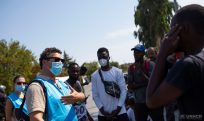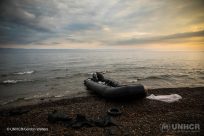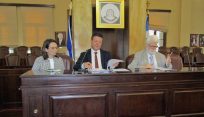UNHCR study shows rapid deterioration in living conditions of Syrian refugees in Jordan
UN High Commissioner for Refugees António Guterres says large numbers of Syrian refugees are sliding into abject poverty, and at an alarming rate, due to the magnitude of the crisis and insufficient support from the international community.
He made the statement at the launch of a new UNHCR study, Living in the Shadows, which reveals evidence of a deepening humanitarian crisis. High Commissioner Guterres is on a two-day visit to Jordan, where he will meet refugees profiled in the study in Amman and others at the Za’atari refugee camp.
“I am here to express my solidarity with Syrian refugees, as the impact of snowstorm Huda is still tangible and posing an even greater strain on their already dire living conditions.” Guterres is also meeting with Jordanian officials and with donors to coordinate efforts to improve living conditions for Syrian refugees and support the communities hosting them.
Conducted by UNHCR and International Relief and Development (IRD) the study is based on data from home visits with almost 150,000 Syrian refugees living outside of camps in Jordan in 2014.
According to the study, two-thirds of refugees across Jordan are now living below the national poverty line, and one in six Syrian refugee households is in abject poverty, with less than $40 per person per month to make ends meet.
Almost half of the households researchers visited had no heating, a quarter had unreliable electricity, and 20 per cent had no functioning toilet. Rental costs accounted for more than half of household expenditures, and refugee families were increasingly being forced to share accommodations with others to reduce costs.
“Unless the international community increases its support to refugees, families will opt for ever more drastic coping strategies,” Guterres said. “More children will drop out of school to work and more women will be at risk of exploitation, including survival sex.”
As the Syrian conflict approaches its fifth year, many refugees are becoming increasingly dependent on assistance. Jordan’s resources and infrastructure, too, have been stretched to the limit.
In an effort to address this critical situation, UNHCR is providing monthly cash assistance to 21,000 of the most vulnerable Syrian families, or 14 per cent of the Syrian refugee population living outside camps. As of the end of 2014, over 10,000 additional Syrian refugee households have been identified as eligible for such assistance but, due to lack of funds, cannot be provided with support.
Overall, the report’s findings make it clear that any further reductions in the current levels of support will have immediate and serious consequences for Syrian refugees in Jordan. The situation is particularly worrying for the most vulnerable populations, such as female-headed households and elderly refugees.
Guterres emphasized that this crisis can be mitigated if the international community steps up efforts to alleviate the suffering of the refugees. He praised the efforts of the Jordanian authorities, UNHCR and its partners to address the urgent needs of refugees during last week’s heavy snowstorm.
In total, Jordan has a registered Syrian refugee population of 620,000, some 84 per cent of whom live outside camps.
“This represents a dramatic pressure in the economy and the society of the country not to mention the terrible security impact of the Syria crisis in itself,” Guterres said.
“The generosity of the Jordanian people and the Government needs to be matched by massive support from the international community – support for the refugees themselves and for the local populations hosting them, but also structural and budgetary support to the Jordanian Government for education, health, water and sanitation and electricity to enable it to cope with this enormous challenge.”
Additional Information:
– The “Living in the Shadows” report is available on our media page at: http://unhcr.org/jordan2014urbanreport/.
Page 11 of 26
-

The Quarantine Monologues: Refugee youth write during the Covid-19 pandemic
19 Oct 2020Joint UNHCR/ Hellenic Theatre-Drama & Education Network Press Release
-

Racist Violence Recording Network: Justice shields the rule of law and human rights in Greece
16 Oct 2020The trial of the Golden Dawn case is going to be completed soon, after a lengthy process of almost six years, while the Court has ruled unanimously that Golden Dawn was set up and operated as a criminal organization and found guilty the majority of those accused of a number […]
-

Thematic film screenings on migration
17 Sep 2020Athens, 17 September 2020 – The Greek mission of the International Organization for Migration (IOM) and UNHCR, the UN Refugee Agency, in Greece, with the support of the Municipality of Ioannina, are co-organizing a thematic cycle of film screenings. The event aims to create an open channel of communication between […]
-

Key points of media statements made by Philippe Leclerc, UNHCR Representative in Greece, during his visit to Lesvos island
16 Sep 2020We are in the emergency site which has been set up on Lesvos by the Greek government, with the support of UNHCR, the UN Refugee Agency. Some 1,100 people are currently in the camp – mostly vulnerable individuals. It is from here that the asylum process can continue, and procedures followed, […]
-

UNHCR concerned by pushback reports, calls for protection of refugees and asylum-seekers
21 Aug 2020UNHCR, the UN Refugee Agency, remains deeply concerned by an increasing number of credible reports indicating that men, women and children may have been informally returned to Turkey immediately after reaching Greek soil or territorial waters in recent months. UNHCR firmly reiterates its call on Greece to refrain from such […]
-

Towards ESTIA II: UNHCR welcomes Greece’s commitment to ensure the continuation of flagship reception programme for asylum-seekers
15 Jul 2020Athens, 15 July 2020 – The Ministry of Migration and Asylum, the European Commission and UNHCR, the UN Refugee Agency, signed today in Athens a Grant Agreement on the implementation of ESTIA II rental accommodation scheme for asylum-seekers. The agreement affirms the transition of the accommodation component of ESTIA, currently […]
-

UNHCR and Youth Awareness Committee announce “Things that don’t fit in a suitcase” national contest results
20 Jun 2020UNHCR, the UN Refugee Agency, in Greece and the Youth Awareness Committee1 are pleased to announce on today’s World Refugee Day the results of “Things that don’t fit in a suitcase,” the 23rd National Student Contest on refugees, organized for the school year 2019-2020. Over 1,300 primary and secondary school […]
-

Every action counts: Commemorating World Refugee Day 2020 in Greece
19 Jun 2020World Refugee Day, commemorated every year on 20 June, is a key moment to remind the world that each day people are forced to flee their homes in search of safety and protection. It’s also a day to celebrate the resilience and courage of millions of uprooted people. At the […]
-

Ioannina Municipality and UNHCR strengthen their cooperation on refugee integration
27 May 2020Ioannina Municipality (Western Greece) and UNHCR, the UN Refugee Agency, in Greece, signed today a Memorandum of Cooperation to reaffirm and strengthen their cooperation in a common field of action to benefit asylum seekers, refugees and local communities. This cooperation aims to improve access to services and develop strategies and […]
-

Spread the news, not the virus!
14 May 2020UNHCR, SolidarityNow and pod.gr join voices to provide information on Covid-19 to refugees and migrants in Greece, through a podcast series
